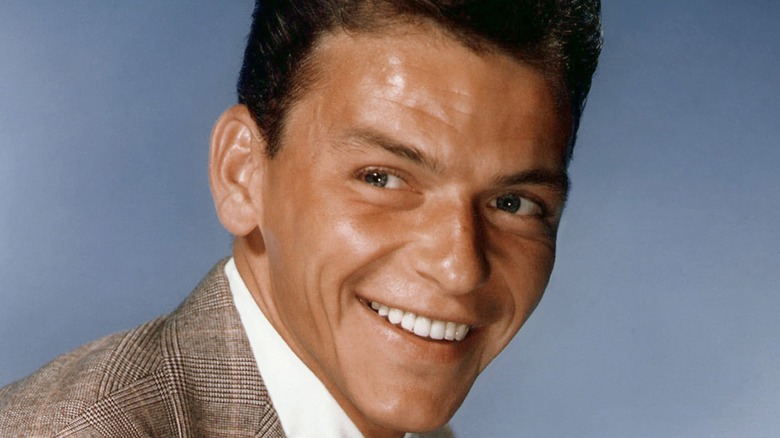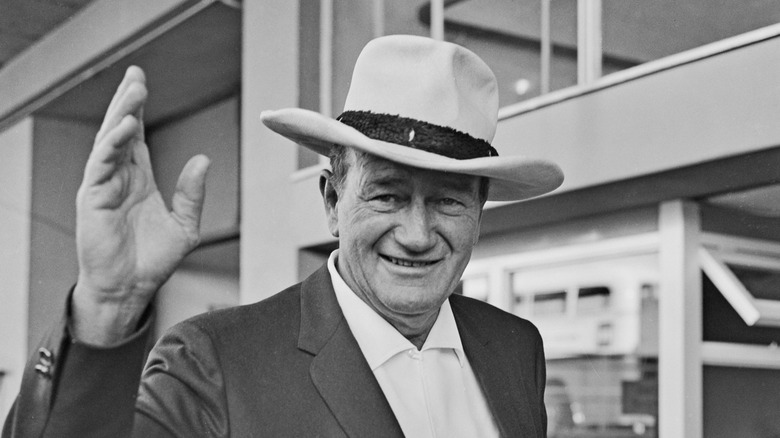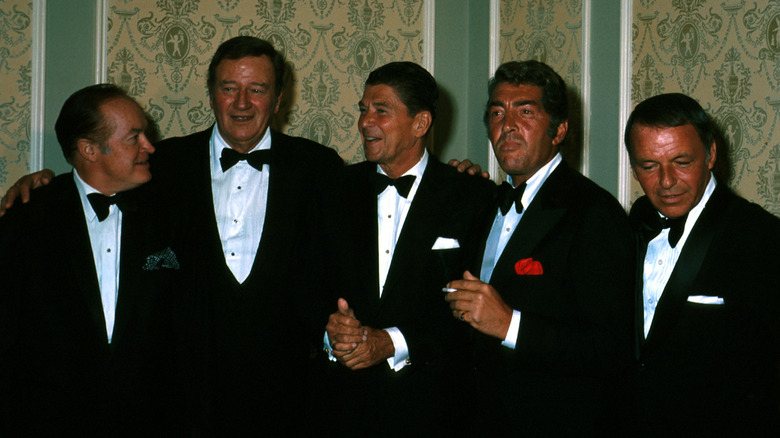Politics Almost Led To A Fight Between Frank Sinatra And John Wayne
It's no secret that politics can ruin friendships and even family relationships. That's become particularly true in the contentious social and political climate of the last few years. As The Atlantic reports, families and friend groups have been blown apart by differences over politics and social issues.
Back in the early 1960s, things might not have been quite as bad as they are now, but the U.S. was in the midst of the Cold War, and the Americans and the Soviets had nuclear weapons pointed at each other. A few years earlier, the "Red Scare" had gotten so out of hand that the McCarthy hearings, in which innocent people were compelled to answer for so-called "un-American activities," ruined lives in the name of weeding out communism.
For a while after the McCarthy hearings, even doing such mundane things as advocating for free speech or nuclear non-proliferation could get you investigated by the FBI.
It was in this context that, one day in 1960, Frank Sinatra and John Wayne — who at the time were on opposite sides of the political spectrum — almost came to blows over politics.
'sinatra's crony'
These days, it's not uncommon for entertainers in music and movies to openly advocate for social and political causes, and it wasn't much different a couple of generations ago. Frank Sinatra, though he moved towards the right in his later years, per Showbiz Cheat Sheet, in his early career was unabashedly left-leaning. John Wayne, by contrast, was always solidly on the right; he frequently bashed "communists," whether they were communists or not, and years later would advocate for continued U.S. involvement in the Vietnam War.
Their differences came to a head in May 1960, as the L.A. Times reported. Sinatra had at least twice in his career worked with Alfred Maltz, a filmmaker blacklisted for communist sympathies, and who had even done time in jail. A reporter asked Wayne what he thought of Sinatra's recent collaboration with Maltz, and Wayne responded, "Why don't you ask Sinatra's crony, who's going to run our country for the next few years, what he thinks of it?" referring to John F. Kennedy, whom Sinatra had openly supported.
A while later, the two men were in the same room and exchanged some testy words about Wayne's comments. According to reports, the two men just about came to blows before they were separated, and cooler heads prevailed.
Wayne, for his part, would try to play it off as if nothing happened. "There was no trouble at all," he said at the time.
Wayne and Sinatra Appear to Have Buried the Hatchet
The evidence seems to suggest that, whatever did or did not happen that night, Frank Sinatra and John Wayne parted amicably. Wayne, for his part, claimed that they'd made peace before they'd even gone home for the night. "[Frank said], 'Duke, we're friends, and we'll probably do pictures together. Let's forget the whole thing,'" according to the Saturday Evening Post.
In fact, the two did make pictures together — or, one picture, to be clear. Both men appeared in1966's "Cast a Giant Shadow," based on the true story of a U.S. Army officer who joined the Israelis in an armed conflict.
Later in his career, SInatra had moved to the right, and according to the New York Times supported Californians for Reagan, of which Wayne was also a part (the photo above is of Sinatra, Wayne, Regan and others at a "Californians for Reagan" event). Sinatra's support for the outspoken conservative was rather shocking to at least one Golden State Democrat, Jess Unruh, who was running against Reagan, and who noted that Sinatra had played a prominent role in the Kennedy campaign a decade earlier.


